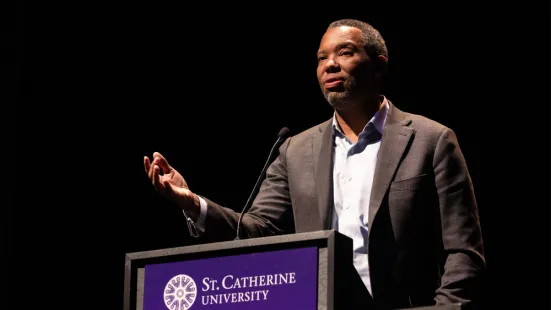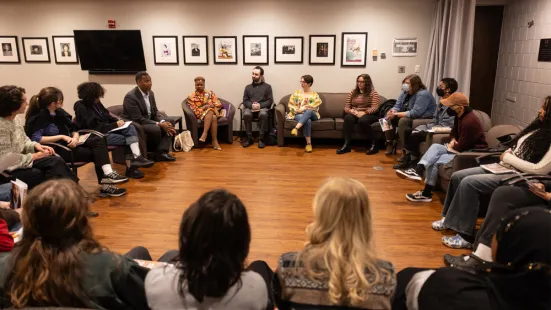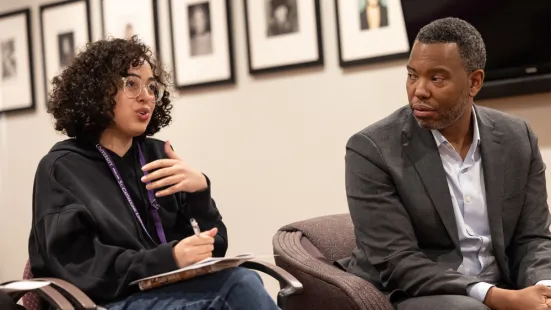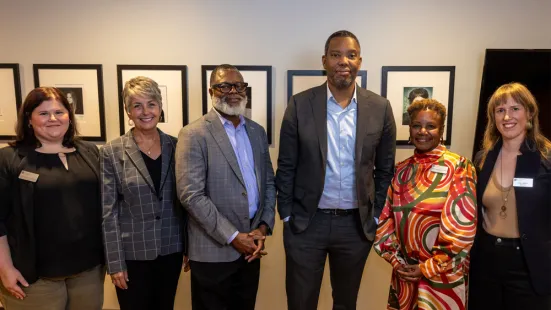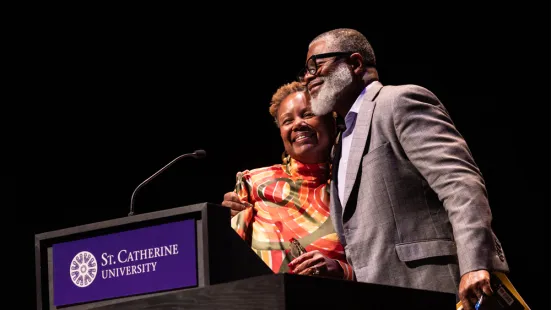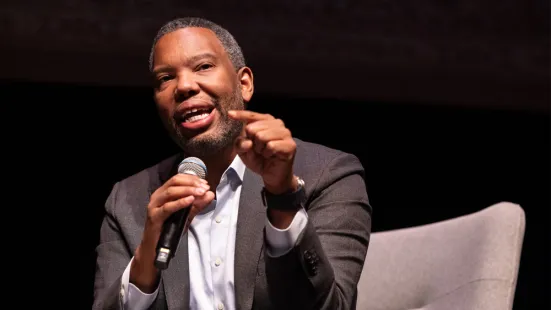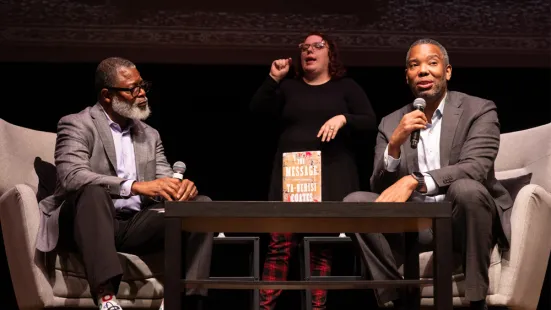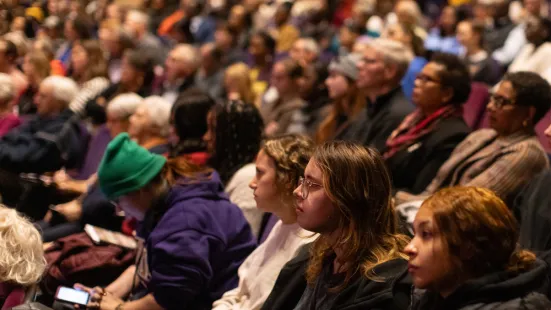On a bright but chilly October evening, St. Catherine University welcomed author and journalist Ta-Nehisi Coates to The O’Shaughnessy auditorium. Coates spoke to a sold out crowd in a wide-ranging conversation moderated by Duchesne Drew, senior vice president of American Public Media Group and president of Minnesota Public Radio.
Coates is the author of The Message, this year’s One Read for Racial Justice book. The Message, written as a letter to his students, explores and challenges prevailing narratives around global justice issues. In his appearance at St. Kate’s, Coates spoke to the interconnected nature of struggles around the world, from the United States to Africa to Palestine, and emphasized the need for an understanding of shared pain and shared responsibility across movements, borders, and history.
“The Black struggle for me has always been at its greatest power…when it gave me some sort of insight into the struggles of humanity itself,” Coates said. “I am always at my best — I am always writing at my most powerful, speaking at my most powerful — when I understand how that empowerment is tied to everyone else.”
Journalism and justice
A journalist himself, Coates discussed the role of journalism in both upholding and unraveling popular narratives. Though journalists are supposed to be objective, history demonstrates that this has frequently been far from the case. Coates brought up the role of newspapers in justifying and inciting lynchings of Black Americans as just one example of the way that media has historically prioritized certain viewpoints — and lives — over others.
“We have always been in concert with the worst that this country is doing,” he said. “You don’t have to go that far back. I remember during the Iraq War when one country was waterboarding, it was torture, but when we did it, it was enhanced interrogation. So the paper of record is adopting the language and propaganda of the people that it’s supposed to cover.”
Though journalism often capitulates to those in power, it also has tremendous potential for exposing the truth and disrupting prevailing narratives — something of which the United States government has long been keenly aware. In 1960, for instance, the U.S. ambassador to Belgium forced Time Magazine to remove the Congolese prime minister Patrice Lumumba from its cover, fearing the influence of the African liberation leader the CIA infamously helped to overthrow and ultimately assassinate. Such censorship implicitly recognizes what might happen when a compelling message that confronts power reaches a broad audience.
“We have a word for that”: A visit to Palestine
The latter half of The Message describes a trip Coates made a few years ago to Palestine and Israel. He told the audience that during his travels he was struck by occupied Palestine’s similarities to Jim Crow America. While visiting the West Bank, he learned there were separate roads for Israelis and Palestinians, with the Palestinian ones full of checkpoints. Palestinian homes had water tanks because their water access was so limited by the state, while nearby Israeli settler neighborhoods had swimming pools.
“You tell me that I have to live under one system of criminal justice, and my neighbor lives under another one,” Coates said. “You tell me that I have one level of service, and my neighbor has another. You tell me I have to go down this road that’s pockmarked with checkpoints, and my neighbor is free to move freely from here to there — we have a word for that. There’s a name for that.”
Coates noted that when he makes this comparison to Jim Crow, he often hears from people who bring up that approximately 20% of Israeli citizens are Palestinians who are accorded the same rights, some of whom even serve as members of the government. “Yes, that’s true,” he said. “And what I would say to you is during the era of Jim Crow in this country, we had Black congressmen and Black judges. Just because Adam Clayton Powell was in New York, do you think we weren’t under Jim Crow? We were.”
Coates continued, “I hope for liberation for everybody. And I don’t think segregation is liberation. I don’t think it is happiness, I don’t think it’s safety.”
It can be difficult, Coates acknowledged, to peel back the layers of the stories we have been told for so long. For most of its history, the narrative in the United States has largely centered on the Israeli point of view; Palestinians’ experiences have been systematically occluded or ignored. But, Coates argued, anyone who is committed to justice has a responsibility to question the stories they are told. This search for the truth involves listening, asking, reading, and researching; it can involve traveling, as it did for Coates. But it also involves trusting our own intuition, even in the face of familiar claims. “I think there’s a voice in the back of your head that tells you when something sounds suspicious,” he said. “Something about this doesn’t seem right.”
At a difficult historical moment, Coates reflected on the continuity between past justice movements and the work that is still ongoing.
“You wake up in the morning, put your clothes on, and go out there and fight,” he said. “Nobody knows if you’re going to win or lose. But all losses aren’t the same. Some losses are dishonorable, and some aren’t. I hail from a lineage of people who lost a lot, but who knew how to lose with honor. What is in our control is how we as a movement, we as a people, if I can be that broad in that collective — what is in our control is how we fight.”
